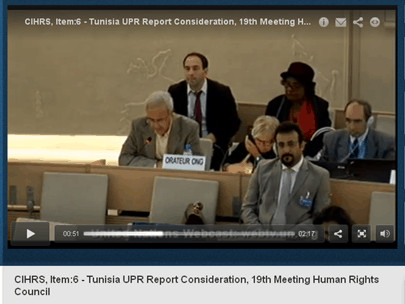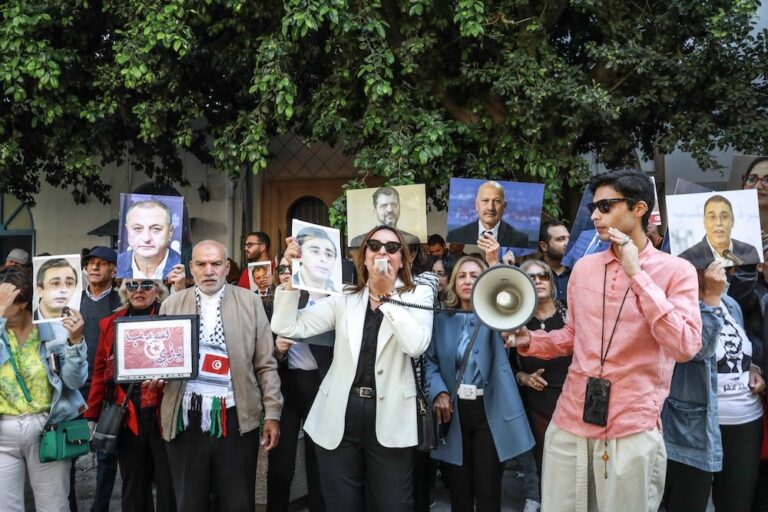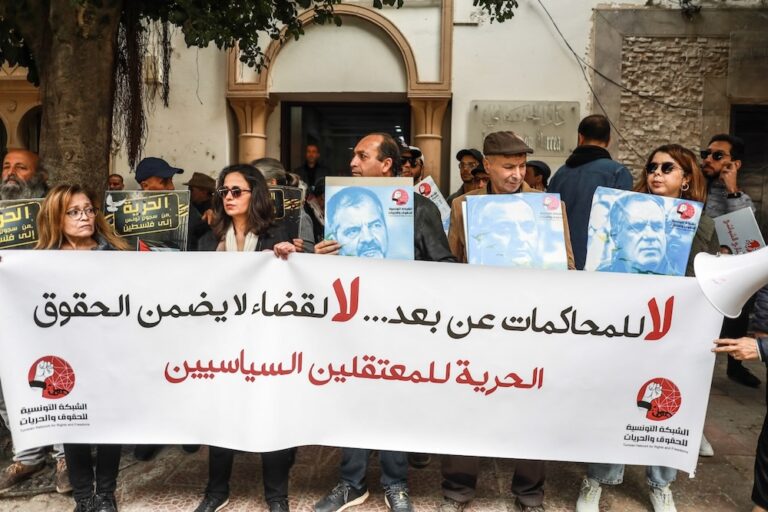While welcoming Tunisia’s acceptance of 110 of its 125 recommendations during a UN review last week, the IFEX-TMG calls on the country to implement them without delay and end the criminalisation of defamation.
(IFEX-TMG) – While welcoming Tunisia’s acceptance of 110 of its 125 recommendations during a United Nations review last week, the IFEX Tunisia Monitoring Group (IFEX-TMG) calls on the country’s leadership to adopt the recommendations related to freedom of expression without delay. Furthermore, the IFEX-TMG encourages a review of the legal basis for refusing to end the criminalisation of defamation, as was called for by one recommendation that the country rejected during the Universal Periodic Review (UPR) of Tunisia that was adopted in Geneva.
During his presentation at the UPR session on 19 September, Samir Dilou, the Minister of Human Rights and Transitional Justice, once again invoked the idea of “tradition” and “culture” in order to avoid answering specific questions related to the state of human rights and freedom of expression in Tunisia. The Minister used an argument that has been repeatedly used to appease rights defenders when he said, “Tunisia needs more time to build a culture of human rights.”
Ideas about tradition have been easily manipulated to suppress dissent and freedom of association and expression in Tunisia, where violations to the right to freedom of expression have been occurring with impunity in the name of “sacred values.” The IFEX-TMG calls on the Tunisian government to comply with the United Nations Human Rights Council’s mechanisms and to take immediate steps to fully implement the recommendations brought forth during the UPR process related to freedom of expression.
While Minister Dilou claimed that Tunisia is laying the foundations of a State which respects human rights while also respecting its cultural identity, IFEX-TMG continues to document cases of civilians who are referred to exceptional courts to punish them for expressing their opinions, as in the case of a former advisor of the president which is currently pending before a military court.
“Media professionals continue to be referred to trial before a judiciary that is not yet fully independent, simply for performing their jobs, or are threatened with litigation,” said Kamel Labidi, a Tunisian journalist who made an oral intervention on behalf of the IFEX-TMG and its member the Cairo Institute for Human Rights Studies (CIHRS) on 19 September.
Labidi is IFEX-TMG’s former advocacy director as well as the former president of the National Authority to Reform Information and Communication (INRIC), which ended its work in July, stating that it could no longer function in the current atmosphere of instability and obstruction. INRIC also launched a comprehensive 300-page report (now available on-line in English, French and Arabic) with recommendations for media reform to reverse the effects of the relentless assault on the media under the regime of Ben Ali. Welcoming this report, IFEX-TMG members have adopted many of the same recommendations, which were made in consultation with numerous and diverse representatives of civil society and media in Tunisia.
At the UN last week, the Tunisian Minister of Human Rights and Transitional Justice stated that the government had undertaken consultations with media unions and others to ensure media freedom and that the government was carrying out reform with integrity. Yet, local NGOs and media experts say they have not been properly consulted, and the Tunisian government is acting unilaterally and without transparency when deciding the fate of freedom of expression and media.
Since the beginning of the year numerous attempts to control the media have been seen in Tunisia, including attacks on journalists.
For example, the government continues to appoint media heads without consultation. At the end of August, journalists began a sit-in to protest the naming of Lotfi Touati, a controversial figure who worked for the police and was implicated in corruption and the 2009 government-backed coup against the democratically elected board of the National Union of Tunisian Journalists, as the new director at influential media publishing company Dar Assabah. On 13 September, Touati hit a demonstrating journalist with his car, resulting in the journalist being sent to the hospital for medical care, in what witnesses and lawyers called a deliberate “murder attempt.” This followed comments during a public demonstration in the Casbah the week before by Habib Ellouze, a hardline leader of the Ennahdha party, who urged the government “to hit the media opposed to the Revolution.”
During a separate oral intervention at the UN on 19 September, Ghias Aljundi of PEN International and IFEX-TMG expressed concern about the increasing use of violence against journalists, artists and writers and the failure of the government to put an end to these attacks. “Political and religious leaders have openly called for violence against journalists and the government has taken no action,” he said. “A legal vacuum has been created which has allowed the government to control the press, and there have been clear delays when it comes to legal reforms, such as implementing media decrees passed by the interim government last year.”
“Never since 14 January 2011 has the media sector been so threatened, by virtue of the multiplication of restrictions on freedom of the press and by the government’s desire to keep tight control of the public media,” Labidi told the IFEX-TMG. “On the other hand, fortunately, solidarity among Tunisian journalists has never before been so strong, nor their desire to defend freedom of expression and the independence of public media so tenacious.”
IFEX-TMG calls on the Tunisian authorities to unconditionally implement the recommendations of the UPR report, particularly those related to freedom of expression, freedom of assembly and the independence of the judiciary. It also calls on the government to take practical steps to guarantee freedom of expression in practice in the new constitution and, furthermore, to implement genuine reforms of the judiciary.
Finally, IFEX-TMG welcomes moves by the Tunisian government to engage with the UN and other rights bodies, such as hosting upcoming visits to Tunisia by the Special Rapporteurs on the situation of human rights defenders from the UN and African Commission in October.
Click here to read the IFEX-TMG’s submission to Tunisia’s UPR.



